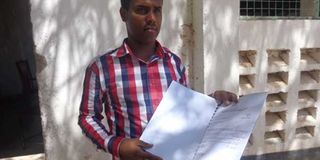We feel ‘stateless’ without IDs, Garissa youth lament

Abdirahm Mohamud Adon displays some of his documents signed by senior government officials as proof of his Kenyan citizenship. Most people without IDs in Garissa had registered in the refugee database for economic reasons. PHOTO | ABDIMALIK HAJIR | NATION MEDIA GROUP
What you need to know:
- They old the task-force of their extreme anxiety to get the important documents and their feeling of being ‘stateless’.
- They also said they faced constant harassment by police officers who demand they produce the document.
- Many of those who turned up were categorical that they went into refugee data base for economic reasons and to increase food rations.
- Dadaab Member of Parliament Dr Mohamed Dahiye who gave his views before the task-force said lack of identity cards was a time bomb.
Thousands of people in Garissa who say they are genuine Kenyans but have their finger prints placed in refugee data on Wednesday narrated how their lives are made difficult without identity cards.
They were speaking before a task-force probing double registration of persons
The victims, who are mainly youth between the ages of 18 and 35, told the task-force sitting at the Garissa Guest House of their extreme anxiety to get the important documents and their feeling of being "stateless".
They also said they faced constant harassment by police officers who demand they produce the document.
“I have been arrested more than once by police officers who demand identification within Garissa Town.
"Sometimes I lock myself up at home fearing the same officers. Travelling outside Garissa is a nightmare for us,” Abdirahman Mohamud Adon told the task force.
“I have been given temporary travel documents by security officials but police have still been harassing us and at some point you are either forced to bribe your way out or sleep in police cells,” he added.
INCREASE FOOD RATIONS
Many of those who turned up were categorical that they went into refugee data base for economic reasons and to increase food rations, while others wanted to get opportunities to go to foreign countries.
Lack of identity cards, they said, has led them to remain destitute because they cannot seek formal jobs or engage in any form of legal business since they are not recognised as Kenyans, noting that the only mistake they did was to register themselves as refugees without knowing its impact.
Mr Adon who had all his documents signed by senior government officials in a book form in a bid to deregister from the refugee data base said he had applied to get the document more than four times in different places to try his luck but without success.
“These documents I present before you have been signed by former Defence Minister Mohamed Yussuf Haji (current Garissa Senator). There are also letters stating clearly that I have been removed from the UNHCR database and letters signed by the National Intelligence Service all showing I am a genuine Kenyan, but still I can’t get the document,” he explained to packed hall.
“After inquiring with UNHCR, we have ascertained that the above named person is not a refugee. Please deactivate his information from the data base,” stated a letter dated November 13, 2005 from Refugee Affairs and seen by the nation.
HOPE OF GETTING DOCUMENTS
Mr Adon, 24, said the task force had given him the hope of one day acquiring the important document and be officially recognised as a Kenyan.
Ibrahim Hussein Noor, 26, also narrated to the taskforce a similar predicament of trying to strike off his name from the refugee data, adding that after successfully deregistering, he is still recognised as a refugee and he cannot therefore acquire the ID.
Dadaab Member of Parliament Dr Mohamed Dahiye who gave his views before the task-force said lack of identity cards was a time bomb, noting that youth who feel isolated by their own country may join illegal and dangerous criminals such as the Somali-based militants.
Anxious victims of double registration on Wednesday jammed the guest house where the taskforce, led by its chairman Mathias Omondi, was sitting.
The task force completed a three-day tour of Garissa and promised to present its findings and make recommendation upon conclusion of their investigations in April 2015.





